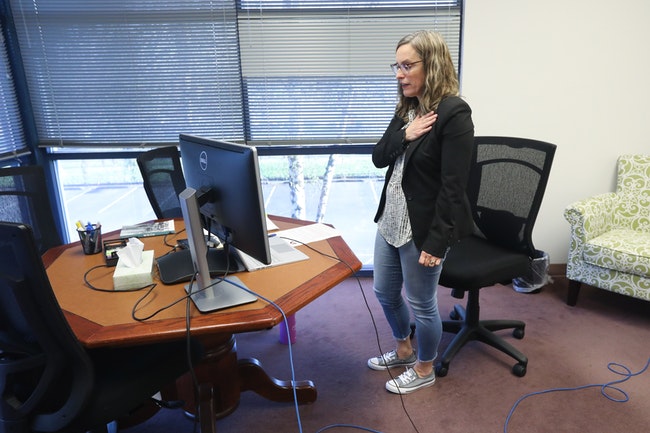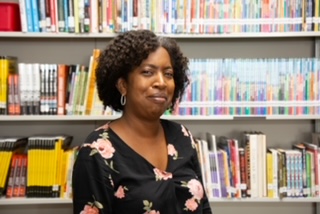Superintendent Christy Perry publicly rebuked her supervisors – the elected Salem-Keizer School Board – during a Tuesday meeting, saying she can no longer ask thousands of district employees to fight against racism without sharing how board members have discounted the experiences of students of color they are supposed to serve.
In an emotional speech, Perry challenged board members who she said have failed to learn from trainings about equity or embrace district and board policies that specify district leaders must specifically consider the impact of policies and practices on students of color, students with disabilities, LGBTQ students and other groups who have historically been underserved in local schools.
“Over the past week, as we’ve met with students from our district who have experienced real traumas in our classrooms because of racism, I’ve shared that my ability to keep the equity work moving means I must keep the real issues out of the Board room. That goes against the very principles that I’ve been sharing with my staff. I am not being actively antiracist,” Perry said.
The seven-member board hires and can fire the district superintendent, who is then charged with overseeing all other district employees and the day-to-day operations of local schools. In Salem-Keizer, the superintendent’s authority extends to setting district policy and curriculum, items local school board vote on in many other districts.
Perry’s speech came after board chair Marty Heyen read a statement addressing the criticism both she and the board as a whole have received in recent days driven by Latino community leaders and students of color who feel board members have dismissed their concerns about police officers in local schools and a broader pattern of systemic racism in school disciplinary processes.
Heyen said she appreciated Latinos Unidos Siempre raising concerns about policing in schools and said the board was committed to a community engagement process over the summer to listen to and address those concerns.
“We have a lot of work to do. We all acknowledge that. And I’m sorry if our delay in speaking has offended you. That was not our intention,” she said.
Heyen also said she’s “hurt by the suggestion that I am a racist,” a charge some critics have levied. Many cited her failure to take action on similar concerns raised by Latinos Unidos Siempre over the course of her time on the board, as well her taking no action publicly in a March 30 board meeting when Director Paul Kyllo held a mask of a Black man’s face in front of his own for the duration of the meeting.
Heyen said board policies prohibit public criticism of other members and said she spoke with Salem-Keizer NAACP leaders following the incident. She noted they had accepted an apology from Kyllo and urged the community to “move on,” echoing an NAACP public statement about the matter.
“I am here, I am serving and I am willing to listen, learn and grow,” she said.
She reiterated that she has a child and grandchildren who are people of color.
“The last couple weeks have been a lot for all of us. Each of us are experiencing pain,” Heyen said. “My pain is reactionary to the attacks toward me that feel unfair and unfounded.”
Perry did not name individual school board members in her remarks other than Sheronne Blasi, who she said has done more work to engage with communities of color and displayed a willingness to listen to other viewpoints.
Blasi publicly called for Heyen’s resignation from the board Tuesday morning, a call no board members addressed directly in speeches at the start of the meeting.
READ: Board director, community leaders call on Salem-Keizer school board chair Marty Heyen to step down
Perry’s speech painted a picture of a board more concerned with internal power struggles and the minutiae of policy than in supporting a diverse student policy or pushing for action to address systematic inequalities.
She said these issues predate the discussion of police in schools and cited a December board meeting where directors were invited to have one-on-one conversations with district employees from marginalized groups to learn about their experiences.
 School board member Satya Chandragiri listens as Rita Glass, president of Salem-Keizer’s classified employees union, and Carlos Ruiz, an assistant principal at North Salem High School, share their experiences as Latino educators at a Dec. 17, 2019 work session on equity(Rachel Alexander/Salem Reporter)
School board member Satya Chandragiri listens as Rita Glass, president of Salem-Keizer’s classified employees union, and Carlos Ruiz, an assistant principal at North Salem High School, share their experiences as Latino educators at a Dec. 17, 2019 work session on equity(Rachel Alexander/Salem Reporter)
READ: School board members moved to tears after conversations about equity, racism in Salem-Keizer
“It was one of the most compelling meetings we’ve had. And then you as a board went right back to worrying about things like who would be the next board chair and how to tackle any concerns you had about policy governance,” Perry said.
Those issues have come into greater public focus now as district leaders have attempted to discuss issues of policing and discipline in schools with students and parents of color in recent weeks.
“After we listened this week, we have continually had to defend to you the experiences of our students of color. You’ve centered every conversation around how we will get the voices in the room who share your perspective,” she said.
Every board director other than Kyllo spoke in turn following Perry’s remarks, most discussing their personal experiences and reiterating a willingness to listen to the community. The speeches consumed roughly an hour of the meeting, where more than 180 people has signed up to give public comment.
Blasi’s remarks were brief, saying that board members have been distracted by issues of individuals and giving speeches over listening.
“The board has been somewhat of a distraction to the important work that needs to be done right now,” she said.
Lippold offered an apology for not addressing Kyllo’s actions earlier.
Kathy Goss, who served as board chair last year, said she believes all board members are there to serve the community and said they shouldn’t respond to “knee-jerk” calls for resignations since the board will elect a new chair and vice chair in July for the coming year.
“I am not interested in any more chaos. I think that’s terrible. We’re watching it around the country,” Goss said.
Chandragiri spoke for about 12 minutes about his experiences as a psychiatrist working with veterans and children, his childhood in India and the “pain” he sees in the U.S. currently.
“I have to bear witness to our whole nation getting ripped apart,” he said. He suggested the board engage in developing “trauma-informed” system for policies and practices around discipline and policing.
Board members voted to approve unchanged a school budget for next year on a 6-1 vote, with Paul Kyllo voting no. He objected because the budget, which was developed before the fiscal impacts of the COVID-19 pandemic were clear, does not outline how district administrators might make cuts over the summer after Oregon releases funding amounts for local districts.
Board members separately committed to a discussion about police in schools over the summer.
Perry and district administrators typically lead community engagement processes, but Heyen said she wanted the board to play a more active role in summer discussions about policing in schools. She suggested an August 30 deadline for board members and district leaders to complete the work so suggestions can be implemented before school started.
“We want to have good conversation,” she said.
SUPPORT ESSENTIAL REPORTING FOR SALEM – A subscription starts at $5 a month for around-the-clock access to stories and email alerts sent directly to you. Your support matters. Go HERE.
Contact reporter Rachel Alexander: [email protected] or 503-575-1241.

Rachel Alexander is Salem Reporter’s managing editor. She joined Salem Reporter when it was founded in 2018 and covers city news, education, nonprofits and a little bit of everything else. She’s been a journalist in Oregon and Washington for a decade. Outside of work, she’s a skater and board member with Salem’s Cherry City Roller Derby and can often be found with her nose buried in a book.










